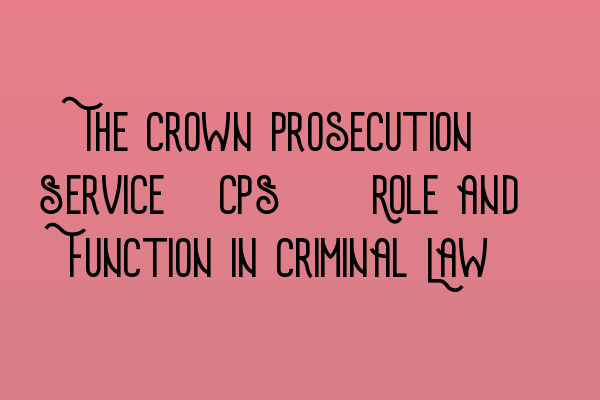The Crown Prosecution Service (CPS): Role and Function in Criminal Law
The Crown Prosecution Service (CPS) plays a crucial role in the criminal justice system of the United Kingdom. It is an independent prosecuting body responsible for prosecuting criminal cases on behalf of the public. In this article, we will explore the role and function of the CPS in the field of criminal law.
Role of the Crown Prosecution Service (CPS)
The primary role of the CPS is to make decisions on whether to charge individuals with criminal offenses and conduct the prosecution in court. The CPS works closely with the police, reviewing the evidence gathered during the investigation and determining whether there is enough evidence to proceed with the case.
The CPS ensures that all prosecutions are carried out fairly and effectively. It provides legal advice to the police during the investigation stage and guides them on the gathering and presentation of evidence. The CPS also advises on the strengths and weaknesses of the case, helping the police make informed decisions.
Furthermore, the CPS has the power to take over private prosecutions and continue them on behalf of the state. This ensures consistency and the proper application of the law across different cases.
Function of the Crown Prosecution Service (CPS)
The CPS has several key functions in the criminal justice system:
- Case Review: The CPS carefully reviews the evidence provided by the police to determine if there is sufficient evidence to bring a case to court. They assess the credibility and reliability of the evidence, ensuring it meets the legal standards for prosecution.
- Prosecution Decision: Once the CPS has reviewed the evidence, they make an informed decision on whether to charge the suspect with a criminal offense. This decision is based on the public interest and the likelihood of securing a conviction.
- Legal Representation: The CPS represents the interests of the public in court by presenting the case against the accused. They work with barristers and other legal professionals to prepare and present the evidence in court.
- Case Management: The CPS manages the progress of criminal cases from the point of charge until their conclusion. They ensure that the case proceeds efficiently, coordinating with other parties involved, such as the defense, witnesses, and the court.
- Victim Support: The CPS provides support and assistance to victims and witnesses throughout the criminal justice process. They aim to ensure that victims are treated with sensitivity and respect, and their rights are protected.
Overall, the CPS plays a vital role in upholding the rule of law and ensuring justice is served in criminal cases. Their expertise and impartiality contribute to the fairness and effectiveness of the criminal justice system.
If you’re studying or preparing for the SQE exams, understanding the role and function of the CPS is important. For additional resources and practice materials, you may find the following articles helpful:
- SQE 1 Practice Exam Questions
- SQE 1 Practice Mocks FLK1 FLK2
- SQE 2 Preparation Courses
- SQE 1 Preparation Courses
- SRA SQE Exam Dates
By familiarizing yourself with these resources, you can enhance your understanding of criminal law and better prepare for the SQE exams.
Feel free to explore our website for more legal articles and resources. Stay tuned for future articles on various legal topics!
